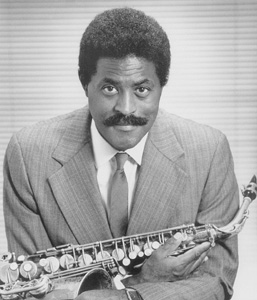Blues Lines
Michael Oletta
Charles McPherson finds his own spot in a bebop blues tradition
By Andrew Gilbert
FOR MORE THAN TWO decades, alto saxophonist Charles McPherson led a double life. In Europe, he headlined jazz festivals and received the kind of respect due a top-flight improviser with a handful of classic recordings under his belt. But in his U.S. homeland, McPherson was overlooked and underutilized, drifting in the midcareer doldrums that afflict far too many improvisers at the peak of their powers.
It didn't help that the alto saxophonist, best known for his intermittent, decade-long tenure with bassist/composer Charles Mingus, settled in Southern California, a region better known for exporting jazz talent than nurturing it. But in the early '90s, McPherson's two disparate identities began to fuse. The process started with a series of high-profile performances at Jazz at Lincoln Center, where his torrid solo on "Hootie Blues" was captured on the Columbia album Fire of the Fundamentals.
In 1994, he signed with the respected independent label Arabesque, resulting in a series of excellent recordings, including his latest, Manhattan Nocturne, featuring an A-list rhythm section of pianist Mulgrew Miller, bassist Ray Drummond and drummer Victor Lewis. Finally, it seems that the 59-year-old McPherson is starting to gain the recognition his fiery, bebop-derived improvisations have long warranted.
A product of the vital Detroit jazz scene of the mid-1950s, McPherson grew up on the same block as legendary bebop pianist Barry Harris and trumpeter Lonnie Hillyer. He began playing alto as a young teen, influenced at first by Duke Ellington's supremely lyrical altoist Johnny Hodges. But by the mid-'50s, he had come under the spell of bop progenitor Charlie Parker, an influence that can still be heard in his blues-drenched lines today.
Like so many of his Detroit compatriots, McPherson made the move to New York in the late '50s, and it wasn't long before he hooked up with Mingus. It wasn't a case of being in the right place at the right time so much as the workings of the ever-active Motown grapevine.
"Yusef Lateef knew that Mingus needed a trumpet player and an alto player to replace Eric Dolphy and Ted Curson," McPherson recalls. "And Lateef knew Lonnie Hillyer and me from Detroit, and he knew we'd probably be able to play Mingus' book and recommended us. We met Mingus at a jam session in the Village, and he hired us."
Though Hillyer passed out of Mingus' band and into obscurity, McPherson worked with the bass player on and off through 1972. Despite the bassist's reputation as a difficult and sometimes violent bandleader, the alto saxophonist stayed with Mingus longer than any musician besides drummer Dannie Richmond.
"For some reason I think Mingus liked me," McPherson says. "Some weird shenanigans went on between him and musicians. But most of his shenanigans involved somebody in the audience, people talking or some guy calling Mingus 'shorty' or 'fatty.' There were plenty of times that I thought some physical violence was going to go down."
For McPherson, the challenge of working with Mingus was the bandleader's demanding style. Though over the years many critics undervalued McPherson as a Charlie Parker disciple, the truth is that Mingus never tolerated copy cats.
"He was difficult to work with because he insisted on his music being a certain way," McPherson says. "I think he knew what he wanted at the moment, but he always wanted something different the next day. A lot of it depended on what was happening in his personal life. He could be very jovial and happy and delightful. But he was very high strung and complex."
Though McPherson is featured on a number of classic Mingus recordings, the long association with the unpredictable bassist didn't serve as much of a career springboard. McPherson made a number of fine recordings in the '60s and '70s for such jazz labels as Prestige, Xanadu and Mainstream, often featuring a compatriot from the Detroit scene, pianist Barry Harris.
But it's often the Mingus connection that draws him back into the limelight. Whether he's playing or composing his own material, McPherson's experiences with the bassist still mark his sound. "I really learned a lot about writing and composition from Mingus," McPherson says. "I learned from watching him compose and work things out. It's pretty rare for me to play a whole concert without playing at least of one of his tunes."
[ Santa Cruz | MetroActive Central | Archives ]
Copyright © Metro Publishing Inc. Maintained by Boulevards New Media.
![]()
 Charles in Charge: Charles McPherson offers a night of alto saxophone jazz at Kuumbwa.
Charles in Charge: Charles McPherson offers a night of alto saxophone jazz at Kuumbwa.
Charles McPherson plays Monday (7:30pm) at Kuumbwa, 320-2 Cedar St., SC. Tickets cost $17/$15. For more info, call 427-2227.
From the October 22-28, 1998 issue of Metro Santa Cruz.
![[MetroActive Music]](/gifs/music468.gif)